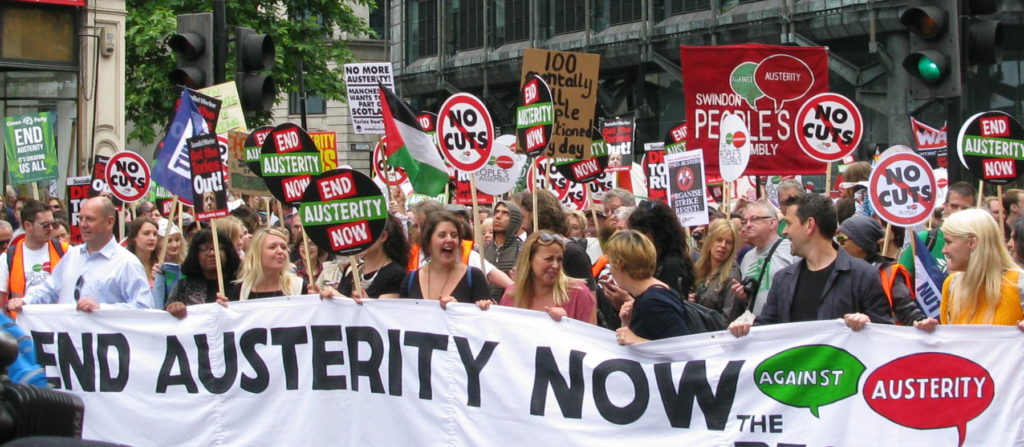Greens slam Osborne’s 2015 budget
This morning, George Osborne unveiled the first Conservative government Budget since 1996, which he claimed was ‘a plan for Britain for the next five years to keep moving us from a low wage, high tax, high welfare economy; to the higher wage, lower tax, lower welfare country we intend to create.’
People have responded to Osborne’s Budget with protests up and down the country, and leading figures from the Green Parties were fast to criticise the measures included in the Budget.
In her response to the Budget, Green MP Caroline Lucas said it was ‘cruel and counterproductive‘ and a ‘serious blow’ for the fight against climate change.
‘The welfare cuts announced today will plunge thousands of people in poverty, and cause families to be evicted from their homes. I’m deeply concerned that my own constituents are set to face needless hardship as this Government continues its economically illiterate and utterly unjust mission to hack away at our welfare state and public services.’
Lucas also said: ‘Ministers know that climate change presents a huge threat to our economy and national security – not just to public health and our environment. Yet George Osborne has refused to change direction and, in axing the climate-change levy exemption for renewable electricity and committing to further funding for road building, he’s putting progress on climate change in jeopardy.’
Patrick Harvie, co-convener of the Scottish Green Party, said that the Budget ‘confirms the Conservative Party’s ruthless disregard for the wellbeing of the majority, as they recklessly pursue an unjust mission to decimate our welfare state and public services.’
The only measure in the budget in any way welcomed by Greens was the implementation of a ‘National Living Wage’ of £9 by 2020. However, Natalie Bennett, leader of the Green Party of England and Wales, emphasised that this even with this, ‘the tax credit and other benefit cuts are going to leave many struggling families close to or over the edge of financial disaster’. Patrick Harvie said that ‘in the context of £4.5bn cuts to tax credits this policy is clearly not a real Living Wage, it is a sleight of hand, to distract from the corporate tax cuts to the very businesses which have created so much working poverty.’
Additionally, the living wage would only be available for workers over 25, only one of the ways in which young people would be hurt by the new measures. Housing benefit will also be cut for 18- to 21-year olds. Additionally, students will be hurt by many of the measures to be implemented by the Budget. Maintenance grants for students (paid to students with family incomes below £42,000) are to be scrapped and converted into loans from 2016/17, and tuition fees would no longer be capped at £9000 a year for British and EU undergraduate students, but rise in line with inflation.
Disabled people will also be hard hit by new measures, with Bennett claiming that ‘the dropping of the level of Employment Support Allowance is a direct attack on the ill and disabled’. There will also be cuts to employment and support allowance payments for new claimants deemed capable of ‘work-related activity’.
Lower-income households would also be badly affected, with Bennett pointing out that the drop in the benefits cap from £26,000 a year per household to £20,000 (and £23,000 in London) ‘comes in the light of a legal ruling that the existing inadequate level puts Britain in breach of its obligations under the UN Convention on the Rights of the Child’. Caroline Lucas also stated that ‘the Government’s own advisors say slashing the benefits cap will throw 40000 more children into poverty’.
Patrick Harvie said of the new cuts to welfare: ‘This Government’s ideological obsession with welfare cuts will plunge thousands more people into poverty, and I’m deeply concerned that we will now inevitably see a steep rise in the numbers facing needless hardship, while the services they rely upon also struggle from financial pressures and lack of support.’
With young people, students, disabled people, low-income families and the unemployed all faced with the worst impacts of the government’s new austerity measures outlined in the Budget, it is the wealthy, the banks, and the corporations that will benefit.
For instance, there would be an increase in the inheritance tax threshold to £1 million by 2017, which Lucas pointed out that ‘according to Treasury’s own analysis, benefit high income and wealthy households’. Instead, she said that the ‘level of the tax should depend on the wealth of the recipient, not the donor’, which ‘would encourage people to spread their wealth more widely’. Corporation tax would also be cut to 18% in 2020, which Patrick Harvie argued ‘simply represents a different way of subsiding the wage bill of big business’.
Finally, the budget increased an increase to defense spending to 2% of national income, which Harvie lambasted as “more talk of security” purely in terms of a Cold War-era mind set’.
UPDATE:
Steven Agnew, leader of the Northern Ireland Green Party and an Assembly Member for Northern Ireland, gave Bright Green his response to the budget:
Osborne’s budget headline is the introduction of a living wage. This deception is indicative of his budget as in reality it is an increased minimum wage repackaged, any advantage of which will be more than offset by cuts to tax credits.
In addition, the exclusion of those under 25 from the new minimum wage, the attack on student maintenance grants and the additional conditions place on housing benefit for those under 21 shows this is a budget that is bad news for young people.
In general the young didn’t vote Tory and the Conservatives have responded in kind.
The final insult is the giveaways for big business in terms of a corporation tax cut and the wealthy in terms of inheritance tax. At a time when child poverty continues to rise this is deplorable.



I am a carer for my brother in law who has severe learning difficulties and requires 24 hours support due to him been unable to live independently. Not 2 days after George Osborne delivered his budget did we receive a letter stating that they are phasing out severe disablement allowence and changing it to employment support allowence which as you can imagine is quite maddening not only at the fact of the change in benefit but how on earth do these people think that he will be able to become employed when he can’t even tie his own shoes, needs reminding to change his clothes as well as countless other daily activities that we have to support him with. It baffles me to think what this government is doing and who makes thes ridiculous decisions I only hope that when the time comes for him to have his medical and work related interview those who conduct this see how ridiculous the whole situation is. All I know Is that this is the torys making the world a better place for themselves not those who are on the bread line who can’t work.